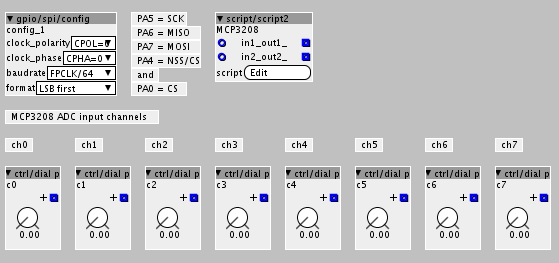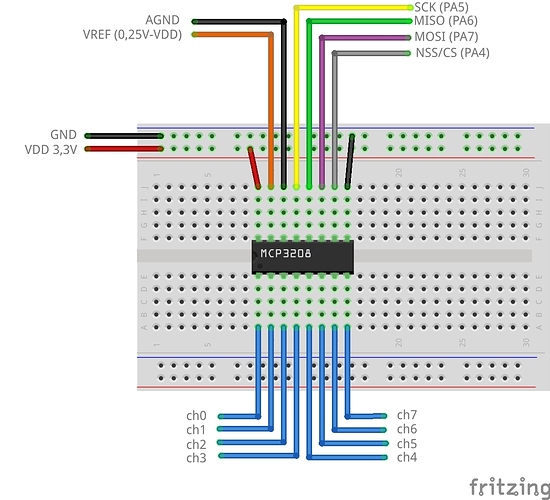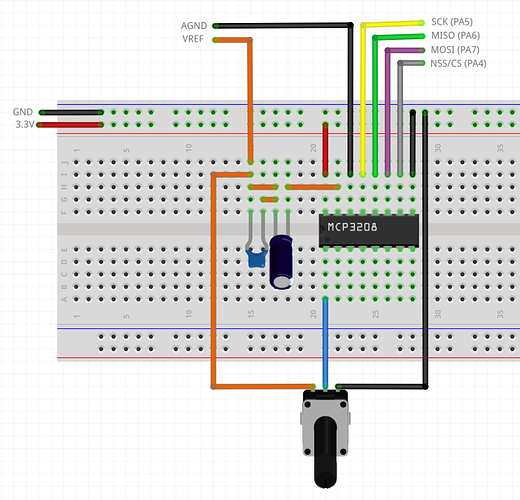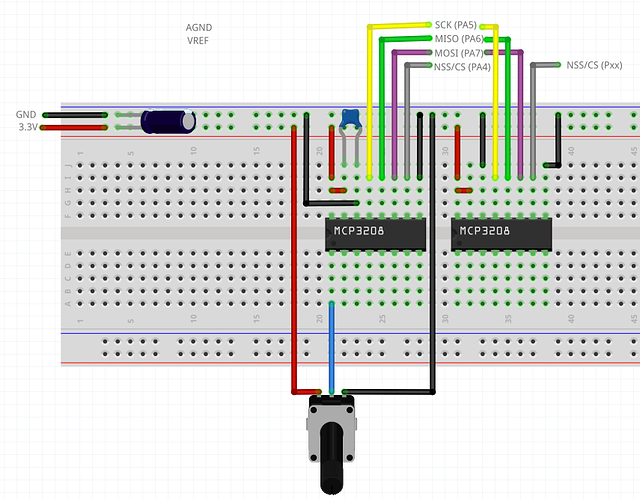Ok I'm hoping this is a software problem. I get accurate readings on 16 pots using 2 MCP3208 if, and here's the catch...
I always get accurate readings from MCP3208 #1, the one connected to axoloti PA4
I only get accurate readings from MCP3208 #2, connected to PA3 if the pot on the same pin number on the other MCP3208 is turned to the maximum, otherwise I get some sort of average. If I turn the pot down, I get no reading at all..
I'm guessing somewhere in my script I multiply the values,
- but I reinitialised the vars,
- I increased the sleeptime between polling (thought it was some overflow)
- I renamed the z var in the second loop
It took me quite a while to figure out why everything was dancing and then not, I thought it was hardware, so I resoldered a lot of things... apparently for nothing, or not? a bit puzzled.
below is my version of the script
/*
MCP3208 script2 code
by paul
adapted by kaos, this script is not working, there is problem...
Connect the MCP3208 CS pin to the NSS(PA4) or any other digital out pin of axoloti.
In this example, the MCP3208 CS pin is connected to axoloti B0(GPIOB,0) pin.
If you use more then one spi device, it's importent to disable every other spi device by switching their cs pin.
*/
uint8_t *txbuf;
uint8_t *rxbuf;
const SPIConfig spicfg_a = {NULL, GPIOA, 4, 3<<3 | SPI_CR1_LSBFIRST }; //MCP3208 pin PA4
const SPIConfig spicfg_b = {NULL, GPIOA, 3, 3<<3 | SPI_CR1_LSBFIRST }; //MCP3208 pin PA3
void setup(void){
static uint8_t _txbuf[8] __attribute__ ((section (".sram2")));
static uint8_t _rxbuf[8] __attribute__ ((section (".sram2")));
txbuf = _txbuf;
rxbuf = _rxbuf;
palSetPadMode(GPIOA,4,PAL_MODE_OUTPUT_PUSHPULL); // MCP3208
palSetPadMode(GPIOA,3,PAL_MODE_OUTPUT_PUSHPULL); // MCP3208
//changes
palWritePad(GPIOA,4,1); // pull high to disable first MCP3208
palWritePad(GPIOA,3,1); // pull high to disable second MCP3208
}
void loop(void){
// txtbuf[0] = txtbuf[1] = txtbuf[2] = 0b00000000;
txbuf[2] = 0b00000000;
for(int pin=0; pin<8; pin++){
txbuf[0] = pin < 4 ? 0b01100000 : 0b11100000;
if (pin % 4 == 0) { // pin == 0 || pin == 4
txbuf[1] = 0b00000000;
} else if (pin % 4 == 1) { // pin == 1 || pin == 5
txbuf[1] = 0b00000010;
} else if (pin % 4 == 2) { // pin == 2 || pin == 6
txbuf[1] = 0b00000001;
} else {
txbuf[1] = 0b00000011;
}
palWritePad(GPIOA,4,0); // enable MCP3208 #1
spiSelect(&SPID1); // START SPI
spiSend(&SPID1,3,txbuf); // send SPI data txbuf[]
spiReceive(&SPID1,3,rxbuf); // receive SPI data from MCP3208
spiUnselect(&SPID1); // STOP SPI
palWritePad(GPIOA,4,1); // disable MCP3208 #1
int z = (rxbuf[1] << 8| rxbuf[0]) << 16;
if (pin == 0){
PExParameterChange(&parent->PExch[PARAM_INDEX_c0_value],z,0xFFFD);
}
else if (pin == 1){
PExParameterChange(&parent->PExch[PARAM_INDEX_c1_value],z,0xFFFD);
}
else if (pin == 2){
PExParameterChange(&parent->PExch[PARAM_INDEX_c2_value],z,0xFFFD);
}
else if (pin == 3){
PExParameterChange(&parent->PExch[PARAM_INDEX_c3_value],z,0xFFFD);
}
else if (pin == 4){
PExParameterChange(&parent->PExch[PARAM_INDEX_c4_value],z,0xFFFD);
}
else if (pin == 5){
PExParameterChange(&parent->PExch[PARAM_INDEX_c5_value],z,0xFFFD);
}
else if (pin == 6){
PExParameterChange(&parent->PExch[PARAM_INDEX_c6_value],z,0xFFFD);
}
else if (pin == 7){
PExParameterChange(&parent->PExch[PARAM_INDEX_c7_value],z,0xFFFD);
}
}
chThdSleepMilliseconds(10);
txbuf[2] = 0b00000000;
for(int pin=0; pin<8; pin++){
txbuf[0] = pin < 4 ? 0b01100000 : 0b11100000;
if (pin % 4 == 0) { // pin == 0 || pin == 4
txbuf[1] = 0b00000000;
} else if (pin % 4 == 1) { // pin == 1 || pin == 5
txbuf[1] = 0b00000010;
} else if (pin % 4 == 2) { // pin == 2 || pin == 6
txbuf[1] = 0b00000001;
} else {
txbuf[1] = 0b00000011;
}
palWritePad(GPIOA,3,0); // enable MCP3208 #2
spiSelect(&SPID1); // START SPI
spiSend(&SPID1,3,txbuf); // send SPI data txbuf[]
spiReceive(&SPID1,3,rxbuf); // receive SPI data from MCP3208
spiUnselect(&SPID1); // STOP SPI
palWritePad(GPIOA,3,1); // disable MCP3208 #2
int zz = (rxbuf[1] << 8| rxbuf[0]) << 16;
if (pin == 0){
PExParameterChange(&parent->PExch[PARAM_INDEX_d0_value],zz,0xFFFD);
}
else if (pin == 1){
PExParameterChange(&parent->PExch[PARAM_INDEX_d1_value],zz,0xFFFD);
}
else if (pin == 2){
PExParameterChange(&parent->PExch[PARAM_INDEX_d2_value],zz,0xFFFD);
}
else if (pin == 3){
PExParameterChange(&parent->PExch[PARAM_INDEX_d3_value],zz,0xFFFD);
}
else if (pin == 4){
PExParameterChange(&parent->PExch[PARAM_INDEX_d4_value],zz,0xFFFD);
}
else if (pin == 5){
PExParameterChange(&parent->PExch[PARAM_INDEX_d5_value],zz,0xFFFD);
}
else if (pin == 6){
PExParameterChange(&parent->PExch[PARAM_INDEX_d6_value],zz,0xFFFD);
}
else if (pin == 7){
PExParameterChange(&parent->PExch[PARAM_INDEX_d7_value],zz,0xFFFD);
}
}
chThdSleepMilliseconds(10);
}
Kaos





